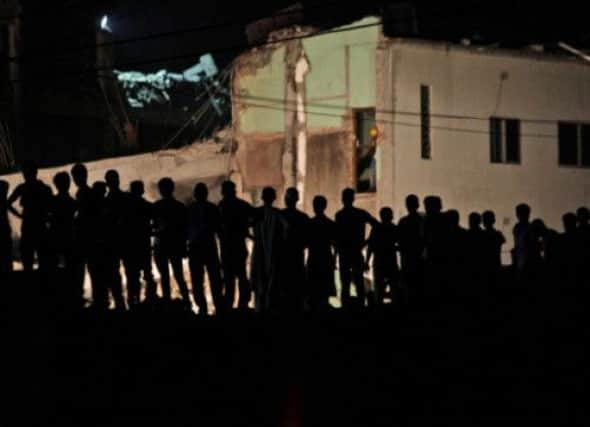Christine Jardine: Health and safety cannot be taken for granted


Listening to a radio phone-in show this week, I was struck that callers talked mostly about the important questions it raised for cut-price clothing stores in the UK whose goods were manufactured on the Indian subcontinent.
Much of the public debate has also focused on whether we, as consumers, should be more aware of the conditions in which our clothes – and other goods – are made.
Advertisement
Hide AdAdvertisement
Hide AdIn this particular case, news programmes have detailed how a dangerous building came to be used for mass production and the pressure put on the workforce to return to the factories, even when it was clear that they were not safe. But what we seem less concerned about is whether there are any lessons we can draw in this country from seeing what the unfettered pursuit of profit can do in the workplace.
That might sound like an outrageous suggestion – indeed, the tone of much of the coverage suggests that we are confident that a century of trade union representation and a strict health and safety regime have created “superior” conditions in this country.
Our offices and factories have, we believe, long left behind the “Victorian” conditions to which we often liken factories in the developing world. Complacency, however, can be a dangerous thing. Should we not all be wary of what could go wrong if we allow our guard to slip and the standards we take for granted are compromised?
The day before innumerable lives were destroyed or disrupted by that factory collapse in Dhakar, I bumped into a former colleague during a visit to the Scottish Parliament. Louise Taggart was taking part in an exhibition to draw attention to health and safety issues in Scotland.
It was organised by Fack – Families Against Corporate Killing – an organisation that pursues an improved awareness of health and safety issues in this country. It was established in 2006 by people – like Louise – who have suffered the loss of a family member or friend as the result of an industrial accident. Her brother Michael was an electrician. He died after cutting through a cable that was supposed to have been isolated.
The group is driven by the desire for justice for loved ones who lost their lives at work in this country and to make us all aware of the danger of turning a blind eye to potential hazards. Specifically, it has campaigned for the creation of a law on corporate killing to hold to account those responsible for fatal incidents at work.
At Holyrood, Fack’s exhibition drew attention to International Workers’ Memorial Day on 28 April and what it sees as the shortcomings of our current approach. Fack’s argument rests not on the emotion and grief all those affected by workplace deaths carry, but on what its members say are the hard facts and statistics. On the day we met, the Bangladesh disaster had not yet happened and the most recent high-profile example of large-scale industrial fatalities was the fertiliser factory explosion in West, Texas, in the United States. There, says Fack, the most recent official safety inspection was carried out in 1985 – more than 20 years ago.
In the UK, inspection and enforcement is the responsibility of the Health and Safety Executive. Campaigners want to see this stepped up. They don’t accept the argument, recently quoted by UK employment minister Mark Hoban, that health and safety should focus on the areas where risk is high.
Advertisement
Hide AdAdvertisement
Hide AdFack claims its figures show that more than 50 per cent of deaths at work in this country last year were in so-called low-risk environments – industries such as agriculture and electrical engineering.
Fack has little truck with the current push by the Department for Work and Pensions to relieve employers of some of the “burden” of health and safety legislation. This is an area where DWP recently claimed on its website to be “making rapid progress in restoring common sense to health and safety and saving businesses millions of pounds and considerable time every year”.
That is not to say that DWP – or anyone else – is keen to dismantle the entire edifice of the regulations carefully constructed over decades. But there has been a growing clamour to simplify the requirements of health and safety and do away with a lot of the red tape. The difficulty will be in finding a balance.
I know from personal experience that the attitude among employers can vary dramatically. One big national organisation I worked for insisted that all staff underwent safety awareness training and knew how to complete a hazard assessment of any task before being allowed either to carry it out or ask anyone else to.
At another of similar stature, when I asked what the assessment process was, I was laughed at. I didn’t stay long.
Having said all that, there have been times when I have found some of the small print difficult to justify. But, as a journalist, I have seen up close why safety needs to be paramount. I was on duty in 1988 when the Piper Alpha platform exploded in the North Sea and 167 men lost their lives. I was at the hospital as the survivors were airlifted in. Hours later I watched, horrified, the television pictures of what had gone wrong.
I also know the danger of asking someone to get behind the wheel of a car, or work with machinery, when they are tired.
This week, having seen all too clearly what the cost can be for those who do not enjoy the protection we take for granted, I am more convinced than ever that we need to defend what is best in our health and safety principles. I know they are not perfect, but I wouldn’t want to be without them.